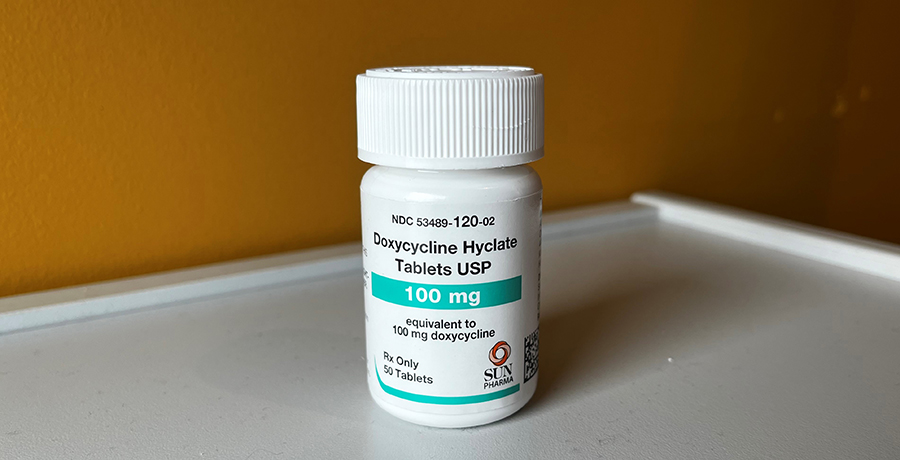Last Updated: October 30, 2025
Side Effects, Coping Mechanisms and Recovery
How My Experience Started
When I first visited my doctor for a routine infection, I expected a straightforward recovery. I was prescribed doxycycline, a commonly used antibiotic, and thought little of it. I had no idea this would mark the beginning of a challenging journey that deeply affected both my physical and mental health.
What is Doxycycline?
Doxycycline is like that dependable friend who’s always there to help.
Doxycycline is a versatile antibiotic from the tetracycline family, used to treat a wide range of bacterial infections.
Doctors often prescribe it for conditions like:
- Urinary tract infections
- Respiratory infections
- Sexually transmitted diseases (such as chlamydia, gonorrhea, and syphilis)
- Severe acne
- Preventive measure against malaria
It works by blocking the growth of bacteria, making it a go-to medication for many illnesses.
My Adverse Reaction To Doxycycline
At first, everything seemed normal. But soon after starting doxycycline, I began to experience troubling side effects. What started as mild nausea and dizziness quickly escalated. Everyday tasks became difficult as I dealt with severe stomach pain, relentless sensitivity to sunlight, and persistent headaches. These symptoms disrupted my routine and left me feeling drained and isolated.
Common Side Effects I Faced
- Nausea and vomiting
- Dizziness and vertigo
- Photosensitivity (increased risk of sunburn)
- Stomach upset
- Headaches
- Occasional allergic reactions

My Mental Health Struggle
The physical symptoms were only part of the challenge. Dealing with constant discomfort took a toll on my mental health.
I found myself battling with anxiety and depression, withdrawing from social activities, and struggling with low self-esteem. The unpredictability of my symptoms made it hard to stay positive.
For some people, especially those on long-term or high-dose doxycycline, mental health effects can be even more severe, including:
- Mood swings
- Psychosis
- Suicidal thoughts
My Advice: If you notice any mental health changes while taking doxycycline, you must speak to your doctor immediately.
My Winning Coping Strategies
Managing these side effects required a proactive approach:
- Staying hydrated helped reduce nausea and headaches.
- Taking the medication with food eased stomach discomfort.
- Avoiding direct sunlight and using sunscreen became essential to prevent sunburn.
- Resting and giving my body time to adjust made a noticeable difference.
- Seeking support from friends and family provided emotional relief and reminded me I wasn’t alone.
Lessons Learned From My Recovery
Over time, my body began to adjust, and the side effects gradually faded. This experience taught me the importance of listening to my body, communicating openly with healthcare providers, and seeking support when needed. I also learned to appreciate the value of community — sharing my story in online forums connected me with others facing similar challenges.
Embracing a New Chapter of My Life
After stopping doxycycline, I faced a new beginning. The side effects slowly faded, and I started to feel like myself again. This period was not just about healing my body, it was about rebuilding my confidence and enjoying life’s simple moments.
I learned to focus on self-care every day. I made time for healthy meals, regular exercise, and enough rest. Staying connected with friends and family gave me strength. Their support reminded me that I was not alone and that asking for help is a sign of courage.
I also paid close attention to my mental health. If I felt anxious or low, I reached out to a counselor or talked openly with people I trust. Sharing my story in online groups helped me find others who understood my journey. We encouraged each other and shared tips for staying strong.
Looking back, I see how much I have grown. The struggle with doxycycline taught me about patience, strength, and the importance of listening to my body. Now, I face the future with hope. I know that even after tough times, it is possible to recover, find joy, and move forward with new wisdom.
What I do to maintain my recovery.
- Take care of your body and mind every day.
- Stay connected with supportive people.
- Seek help when you need it — there is no shame in asking.
- Share your story to help others and strengthen yourself.
- Remember that recovery is possible, and every day is a new chance.
Alternatives Medications and Precautions
If doxycycline isn’t suitable due to side effects, there are alternatives like amoxicillin, clindamycin, or azithromycin, depending on the infection being treated. Always discuss options with your doctor, especially if you’re pregnant, as doxycycline can pose risks to the fetus.
Final Thoughts
My journey with doxycycline was far from what I expected. While it effectively treats many infections, it can also bring significant side effects — both physical and mental. If you’re starting this medication, stay alert to changes in your health and don’t hesitate to reach out for help. With the right strategies and support, it’s possible to navigate even the toughest challenges and come out stronger.
Need help with addiction or mental health? Contact us or review our extensive outpatient Addiction Treatment Programs. We help people with addiction, mental health and recovery.
Opioid usage is rising in America. If you know someone that is struggling with opioids, read our Opioid Addiction page for help.
Drug Rehab New Hampshire
Dr. Mitchell G. Cohen is a board-certified Internal Medicine specialist with over 34 years of experience in patient-centered healthcare. A graduate of Hahnemann University School of Medicine, Dr. Cohen completed his internship at the University Health Center of Pittsburgh, where he gained invaluable hands-on experience. He is also a certified addiction specialist, holding membership with the American Society of Addiction Medicine (ASAM).
Currently based in Nashua, NH, Dr. Cohen is affiliated with Saint Joseph Hospital, where he provides comprehensive care focusing on both internal medicine and addiction treatment. His expertise includes prevention, diagnosis, and management of adult diseases, as well as specialized care for individuals facing substance use disorders.
Dr. Cohen is committed to fostering open communication, ensuring his patients are fully informed and empowered to make confident decisions about their health and treatment options.

MD Mitchell Grant Cohen
Dr. Mitchell G. Cohen is a board-certified Internal Medicine specialist with over 34 years of experience in patient-centered healthcare. A graduate of Hahnemann University School of Medicine, Dr. Cohen completed his internship at the University Health Center of Pittsburgh, where he gained invaluable hands-on experience. He is also a certified addiction specialist, holding membership with the American Society of Addiction Medicine (ASAM).
Currently based in Nashua, NH, Dr. Cohen is affiliated with Saint Joseph Hospital, where he provides comprehensive care focusing on both internal medicine and addiction treatment. His expertise includes prevention, diagnosis, and management of adult diseases, as well as specialized care for individuals facing substance use disorders.
Dr. Cohen is committed to fostering open communication, ensuring his patients are fully informed and empowered to make confident decisions about their health and treatment options.







